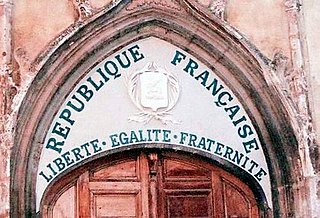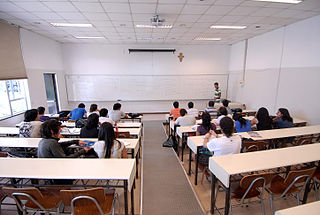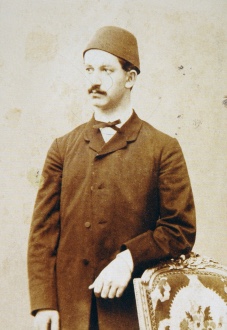Related Research Articles
Secularism is the principle of seeking to conduct human affairs based on naturalistic considerations, uninvolved with religion.

The Justice and Development Party, abbreviated officially as AK Party in English, is a political party in Turkey self-describing as conservative-democratic. It has been the ruling party of Turkey since 2003. Third-party sources often refer to the party as national conservative, social conservative, right-wing populist and as espousing neo-Ottomanism. The party is generally regarded as being right-wing on the political spectrum, although some sources have described it as far-right since 2011. It is one of the two major parties of contemporary Turkey along with the Republican People's Party (CHP).

Laïcité is the constitutional principle of secularism in France. Article 1 of the French Constitution is commonly interpreted as the separation of civil society and religious society. It discourages religious involvement in government affairs, especially in the determination of state policies as well as the recognition of a state religion. It also forbids government involvement in religious affairs, and especially prohibits government influence in the determination of religion, such that it includes a right to the free exercise of religion.

Secular education is a system of public education in countries with a secular government or separation between religion and state.

Elazığ Province is a province of Turkey with its seat in the city of Elazığ. Its area is 9,383 km2, and its population is 591,497 (2022). The population of the province was 569,616 in 2000 and 498,225 in 1990. The province is considered part of Turkish Kurdistan and has a Kurdish majority with a significant Turkish minority.

Islam is the most practiced religion in Turkey. As much as 90% of the population follows the Sunni Madhab of Islam. Most Turkish Sunni Muslims belong to the Hanafi school of jurisprudence. The established presence of Islam in the region that now constitutes modern Turkey dates back to the later half of the 11th century, when the Seljuks started expanding into eastern Anatolia.

Bingöl Province is a province of Turkey. The province was known as Çapakçur Province before 1945 when it was renamed as Bingöl Province. Its area is 8,003 km2, and its population is 282,556 (2022). The province encompasses 11 municipalities, 325 villages and 693 hamlets.

Kemalism, also known as Atatürkism, or the Six Arrows, is the founding and official ideology of the Republic of Turkey based on the ideas and legacy of Mustafa Kemal Atatürk.

In Turkey, secularism or laicism was first introduced with the 1928 amendment of the Constitution of 1924, which removed the provision declaring that the "Religion of the State is Islam", and with the later reforms of Turkey's first president Mustafa Kemal Atatürk, which set the administrative and political requirements to create a modern, democratic, secular state, aligned with Kemalism.

Religion in Turkey consists of various religious beliefs. While it is known that Islam is the most common religion in the country, published data on the proportion of people belonging to this religion are contradictory. The state registering everyone as Muslim by birth misleads the percentage of Muslims in Turkey. There are many people who follow other religions or do not adhere to any religion but are officially classified as 'Muslim' in official records unless they make a contrary claim. According to the state, 99.8% of the population is initially registered as Muslim. As much as 90% of the population follows Sunni Islam. Most Turkish Sunni Muslims belong to the Hanafi school of jurisprudence. The remaining 0.2% are Christians and adherents of other officially recognised religions like Judaism. The official number of Muslims include people who are irreligious; converted people and anyone who is of a different religion from their Muslim parents, but has not applied for a change of their individual records. These records can be changed or even blanked out on the request of the citizen using a valid electronic signature to sign the electronic application.
Erdağ Göknar is a Turkish-American scholar, literary translator, and poet. He is an Associate Professor of Turkish and Middle Eastern Studies at Duke University and Director of the Duke University Middle East Studies Center.
Secularism—that is, the separation of religion from civic affairs and the state—has been a controversial concept in Islamic political thought, owing in part to historical factors and in part to the ambiguity of the concept itself. In the Muslim world, the notion has acquired strong negative connotations due to its association with removal of Islamic influences from the legal and political spheres under foreign colonial domination, as well as attempts to restrict public religious expression by some secularist nation states. Thus, secularism has often been perceived as a foreign ideology imposed by invaders and perpetuated by post-colonial ruling elites, and is frequently understood to be equivalent to irreligion or anti-religion.
National Order Party was an Islamist political party in Turkey, which adopted the Millî Görüş ideology. It was the first political party of the Millî Görüş movement and also the first Islamist political party in Turkey.

Turkey is a predominantly Muslim nation that has abolished polygamy, which was officially criminalized with the adoption of the Turkish Civil Code in 1926, a milestone in Atatürk's secularist reforms. Penalties for illegal polygamy are up to 2 years imprisonment. Turkey has long been known for its promotion of secularism and later introduced even stricter bars on polygamy. Even the ruling moderate AK Parti effectively banned polygamists from entering or living in the country.

The e-memorandum was a controversial set of statements released on the website of the General Staff of the Turkish Armed Forces in April 2007 that weighed in on the Turkish presidential elections in 2007. The way the statements were written caused concerns that the Turkish military would intervene in the election against leading candidate Abdullah Gül in defence of secularism. Turkey's presidential office was regarded as the guardian of the country's secular system; the fact that Gül's wife wore an Islamic headscarf, as well as Gül's own history in political Islam, turned the elections into a political crisis.
Niyazi Berkes was a Turkish Cypriot sociologist.

Secularism in Bangladesh is known as "neutrality of religion" under Bangladeshi law. In the Constitution of Bangladesh, secularism is mentioned in the preamble as one of the fundamental principles of Bangladeshi law. Article 8 enshrines secularism as one of the fundamental principles of state policy. Article 12 elaborates further on secularism and freedom of religion.
Conservative democracy is a label coined by the ruling Justice and Development Party (AKP) of Turkey to describe Islamic democracy. Forming as a modernist breakaway party from former Islamist movements, the AKP's conservative democratic ideology has been described as a departure from or moderation of Islamic democracy and the endorsement of more secular and democratic values. The electoral success and the neo-Ottoman foreign policy of the AKP that aims to broaden Turkey's regional influence has led to the party's conservative democratic ideals to be mirrored in other countries, such as by the Justice and Development Party in Morocco and the Ennahda Movement in Tunisia.

Conservatism in Turkey is a national variant of conservatism throughout Turkey reflected in the agendas of many of the country's political parties, most notably the governing Justice and Development Party (AKP), which describes its prevailing ideology as conservative democracy. Elements of Turkish conservatism are also reflected in most parties situated on the political right, including the Nationalist Movement Party (MHP). In Turkey, it is often referred to as Türk tipi muhafazakârlık.

Erdoğanism or Tayyipism refers to the political ideals and agenda of Turkish President and former Prime Minister, Recep Tayyip Erdoğan, who became Prime Minister in 2003 and served until his election to the Presidency in 2014. With support significantly derived from charismatic authority, Erdoğanism has been described as the "strongest phenomenon in Turkey since Kemalism" and used to enjoy broad support throughout the country until the 2018 Turkish economic crisis which caused a significant decline in Erdoğan's popularity. Its ideological roots originate from Turkish conservatism and its most predominant political adherent is the governing Justice and Development Party, a party that Erdoğan himself founded in 2001.
References
- ↑ "yobaz". Vikisözlük. Retrieved 12 November 2020.
- ↑ Umut Azak, Islam and Secularism in Turkey, I.B.Tauris & Co Ltd, 2010, pp. 87, 111. ISBN 978-1-84885-263-1